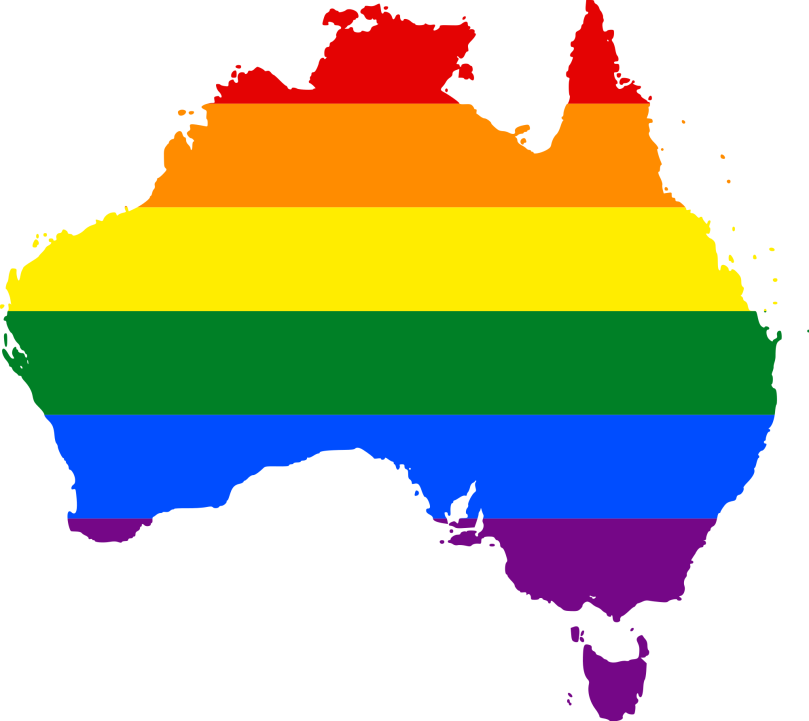In Australia we’re in the middle of a campaign for a government survey on whether the law should be changed to allow same-sex couples to marry. The going is really tough, and a lot of us are feeling really shitty: the attacks are coming strong from the No campaign.
But: some positivity. Despite marriage equality not yet having arrived in Australia, we do have a lot of rights, and rights that are worth celebrating. And importantly rights that prove that our equality does not have terrible consequences for society.
Let’s celebrate these rights, and use their existence to argue for further extension of our civil and human rights.
The right to exist
Fundamentally, in Australia, we have the right to exist. The law doesn’t prohibit our existence. For all the hatred we face, the abuse, the violence, our right to exist is protected. Around the world, not all LGBT people have that right protected.
The right to fuck
Sexuality and sex is a core part of [most of] our existence. In Australia we have the right to fuck anyone who can and does consent. Some people engage in sexual violence against people asserting that right. Some put acid in lube dispensers in gay saunas. But none of that removes the right we have to fuck anyone who can and does consent. Around the world, not all LGBT people have that right protected.
The right to form domestic partnerships
Australia is pretty good when it comes to recognizing de facto partnerships — including those between same-sex couples. We’ve established over the pervious weeks that they are not identical to marriages but even so, de facto couples are afforded most of the rights and benefits that married couples are. It’s not perfect, but we do have some of the most progressive de facto rights and protections in the world.
The right to migrate
Spousal migration to Australia is easy. I know: I’ve done it. Admittedly as a white man, but the right to migrate to Australia as the spouse (de jure or de facto) of an Australian citizen or permanent resident is protected, and dependent on (almost) nothing except the status of the relationship. Migration law recognizes the status of de facto relationships where cohabitation hasn’t occurred because of the illegality of the relationship where the couple previously lived.
In practice it can be hard, expensive, and complicated, but the right to migrate with our spouses exists. Few other countries offer this.
The right to employment
Discrimination against a person on the basis of sexual orientation, gender identity, intersex status, or marital relationship status is against the law in Australia. Employers are not allowed to discriminate against us.
They do, of course. But they don’t have the right to do so. And our right is to be protected by law against such discrimination.
The right to transition
Unlike in many places in the world, trans people in Australia have the right to transition. Socially, medically, and administratively. This is not to suggest it is straightforward or that the process of transition isn’t riddled with gatekeeping bullshit, but trans people have the right to live in whatever gender role(s) suit, according to each person’s own determination.
Trans people have the right to receive support to transition, the right to a name change on official documentation, the right to change gender markers on official documentation (including to X if neither male nor female is appropriate). Around the world not all trans people have these rights.
The right to celebrate
These — and other — rights come along with the right to exist openly and freely. The right to celebrate. We have bars and clubs that are not hideaways, but open and public venues that SCREAM queer. We have Mardi Gras in Sydney every year, and politicians incessantly turn up for photo opportunities. There are plenty of problems in the queer party scene, including racism, sexism, and transphobia, and we need to work on that. But we have the right to work on it because we have the right to celebrate.
The right to marry
Coming soon.
The right to marry is an addition to our existing rights, wide-ranging rights that in Australia are surprisingly progressive. It’s right and good that we demand access to marriage, but let’s do so in the context of celebration of our existing rights, and how much these rights add to society.


